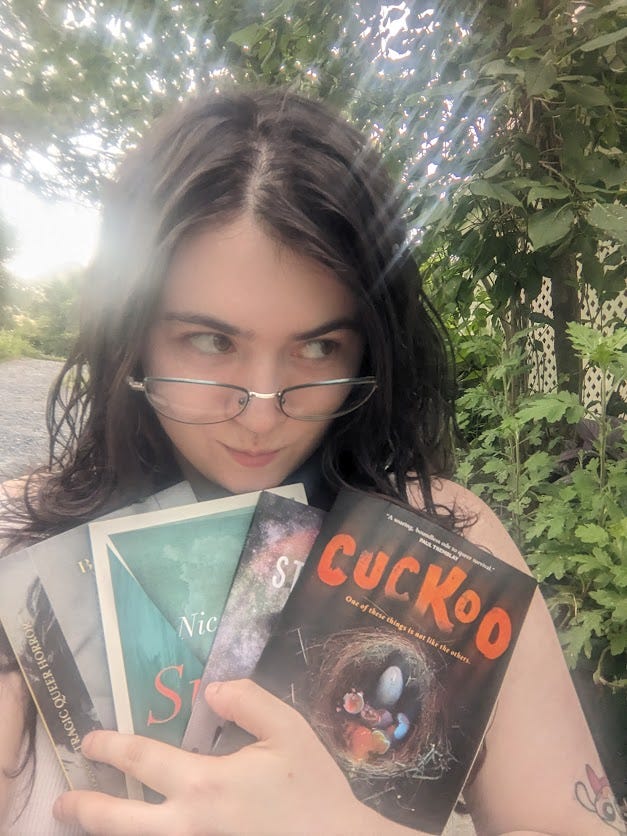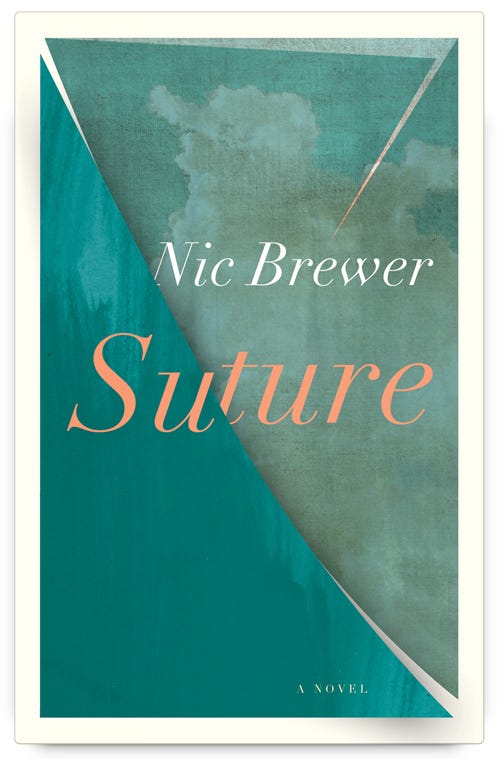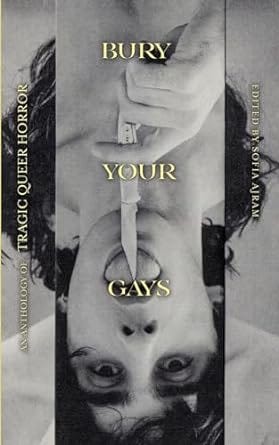Gays, Hide your Guts! 4 reviews of queer horror fiction
dissecting Cuckoo, Suture, Straight, and Bury Your Gays, all by LGBT+ authors and centering LGBT+ characters.
The Books!
Cuckoo (2024) by Gretchen Felker-Martin
Suture (2021) by Nic Brewer
Straight (2021) by Chuck Tingle
Bury Your Gays (2024) edited by Sofia Ajram
Cuckoo (2024) by Gretchen Felker-Martin
(splatter-punk / paranormal body horror / queer fiction)
"For all unwanted children"
When I opened the cover and read that, I just knew this book was gonna break me. And boy it did. I pre-ordered this because I loved Felker-Martin's first book so much. I think I like this one even more.
Inspired by It and Invasion of the Body Snatchers, this story focuses on a conversion camp and the kids who were sent there in 1995. Here we have the background of a growing counterculture movement, satanic panic, and the AIDS crisis. We've got parents who hire people to kidnap their gay and trans teenagers and work them half to death in the desert, to "set them right." The camp is run by a fucked-up pastor family and a mysterious monster, and the violence and horror of the camp increases the longer these kids stay.
Lots of blood, violence, and gore. I will say, I really appreciated the way these kids' trauma was worked into the story. Using flashes of memory, she didn't need to tell all the details of their experiences for the reader to know they were deeply hurt. Not to say this doesn't have sensitive material, but I think it was handled gently, and it didn't linger.
This focuses a lot on homophobia, transphobia, fatphobia, misogyny, racism, and the intersections between all of those oppressions. This author writes with politics in mind, and she creates a powerful, riveting journey full of ups and downs, love and pain, and action and adventure. Once I got a hang of the characters, I was locked in, and I think the exposition was shorter compared to in her first book.
I will say that there are so many characters that I had to make a list in the back of the book to keep up. That's fine with me, it's ambitious, but I think it's good to know going into it. She does constantly describe physical traits when using someone's name, so I didn't feel completely lost.
In Felker-Martin's work, I just see so much effort being made to make as many queer people feel seen as possible. She writes with a lot of sensitivity, and she credits authenticity readers. I feel like I am part of the audience she is writing for and I'm so grateful that she writes. I think she's daring for going into taboo material, and her work makes me feel seen and understood.
Explosions! Aliens! Gooey, unknown substances! Gay sex! Emotional release! Found family! This book has all of that and more and I'm excited for whatever Felker-Martin writes next.
Suture (2021) by Nic Brewer
(body horror / literary fiction)
"To make her films, Eva must take out her eyes and use them as batteries. To make her art, Finn must cut open her chest and remove her lungs and heart. To write her novels, Grace must use her blood to power the word processor."
The prose in this book is both lovely and deeply disturbing. Self-harm as a metaphor for the artistic process. Brewer is a descriptive writer - very good with imagery - but this becomes jarring as she takes you back-and-forth from tender moments of love to brutal scenes of gore. She has an unfortunately good use of onomatopoeia - squelch, pop, splat - YUCK! The cover looks deceptively soft and elegant, but this book is coated in blood, and the iron of it stinks through the words. In a good way?
The stories of 3 different characters are told in 3 parts - beginning, middle, and end. Each chapter is a key snapshot in their lives, spaced years apart, and we get just enough details to know how much time has passed and what has changed. We follow a filmmaker, a visual artist, and a writer from the beginning to the peak of their careers. We watch the lengths they go to for their art - impacting their relationships, their physical health, and their mental health.
The chapters are short, but I needed lots of breaks, especially in the beginning when the nature of the violence was introduced. It's raw, and the attention to color and smell was a lot for me.
I found this more disturbing than Tender is the Flesh (by Agustina Bazterrica) - which literally put humans through the meat grinder, and also had scenes of removing organs, skin, and limbs. I think the major difference is that the violence in Suture is personal and self-inflicted. It's one thing to watch a character be attacked and react to that - it's another thing to watch a character consciously and purposefully hurt themselves. Over and over.
Why is caring so painful? Is art-making an act of self-harm? Certainly, at least sometimes. I feel that I've harmed myself while writing; pushed myself past a reasonable limit for the purpose of the result. Whether it's not eating enough, or sleeping enough, or going out enough, or straining your eyes, or your hands, or whatever part of your body... artists make sacrifices for their craft. They can get lost in it. They can die for it. It's important to pause and take care of yourself throughout the creative process. This book is a strong reminder of that.
Also… the relationship between Dev and Eva was one of the sweetest love stories I’ve ever read. As Eva’s vision slowly faded, and she stopped being able to tell stories through her eyes, her wife Dev took to describing the visual world to her, every day. So, so touching.
Straight (2021) by Chuck Tingle
(sci-fi / cosmic horror / zombie apocalypse / queer novella)
This cute little novella reads like a campy slasher film. It can be funny and ironic sometimes, but there's also plenty of gore and some serious questions about survival and community woven throughout.
4 friends across the queer spectrum rent an Airbnb in the desert to survive "Desaturation Day". For one night a year, an entity in space passes over Earth that makes cis straight people turn into hateful zombies and hunt down LGBT+ people, before they go back to their normal selves the next day.
Written in 2021, I feel that this captures the feeling of living in fear of multiple unknowns: both from living through a misunderstood pandemic, and from witnessing a wave of right-wing backlash to queer acceptance.
There's some conspiracy in the book about whether it's an actual phenomenon or if homophobes are just finally letting loose, but either way, queer people have to survive. There's also a vaccine against the zombie-change, and though it's not fully effective, it makes way for some dialogue on personal and public responsibility. Do you care enough to protect other people, or will you do nothing because you think you won't be the one who's impacted?
The main characters struggle between the desire to stay ready for disaster, and the desire to enjoy the moment. There are real dangers in this world, but they don't want to let the fear rule their lives. Balancing joy with care is necessary, even in dark times. This made the scene of them distracting zombies with a RuPaul song both entertaining and meaningful.
The message is very clear: we protect each other better than our allies do. I love imagining what queer community, self-protection, and survival looks like, and I feel that stories like this are necessary. That's why I keep reading them! This was my first Tingle book, and it certainly tingled me, so I'll probably check out more from him.
Bury Your Gays (2024) edited by Sofia Ajram
Authors include: Cassandra Khaw, Joe Koch, Gretchen Felker-Martin, Robbie Banfitch, August Clarke, Son M., Jonathan Louis Duckworth, M. V. Pine, Ed Kurtz, LC Von Hessen, Matteo L. Cerilli, November Rush, Meredith Rose, Charlene Adhiambo, Violet, and Thomas Kearnes
(tragic queer horror anthology)
What I admire in this book the most is the range. From historical to science fiction, from grim reality to fairytale fantasy, this shows off the chops of 16 different contemporary queer writers. Fearless is one word I could use to describe this horror collection - there's a lot of taboo subjects here and a willingness to dive into the brutal, gory, and tragic details.
Some of these were nasty and creepy, some loving and tender, and a lot of these stories were a mix of both. Pain and pleasure, joy and loss.
I'll get into my favorites.
In "Your Body is Not Your Home", a violent man starts a sadomasochistic relationship with someone who seemingly can't die. That was probably the freakiest one, in a good way. An exploration of limits and what it would be like to have none.
"Black Hole" was a crazy scifi story about star-crossed lovers who are parasites hopping from body to body to be near each other. "Zero Tolerance", also sci-fi, captured the experience of adolescent online bullying, and it had a brutal and satisfying conclusion. "Filthy Animals" was an awesome R-rated version of Pleasure Island from the story of Pinocchio, with a lot of understanding to the experience of addiction.
"Worth the Dying Shame" addresses the existential fears that trans people are facing when it comes to banning gender-affirming care. In this story, black market testosterone has been contaminated with a necrotizing disease, and the characters grapple between their decaying bodies and the desire to live as who they are and make the time they have left count.
"Summer Night" and "Your Honor..." are stories that take place in the 70s - one following a gay-bashing hate crime and the other following a trans woman who dies from a botched illegal surgery that she was desperate to get. I found these to be the saddest stories of them all, because they were real tragedies that killed our elders, and they continue to happen where queer rights are suppressed.
All but one of these stories was a hit for me. (Sorry, “Fortune Favors Grief”, you just weren’t scary.) A few of these authors - Charlene Adhiambo, Meredith Rose, November Rush - are new names to me and this seems to be their first publication. I'll be on the lookout for future work from them, because I'm liking what I see!
If you're interested in queer horror at all, I think this story collection is a wonderful way to see a range of styles and find authors you may like that you've never heard of before. These stories are certainly tragic, but horror is a great way to express and understand difficult emotions. I think that's why I gravitate towards the genre so much; it's healing in a way that doesn't ignore the scary parts of existence. We can look the scariness in the eye and still survive. There's empowerment in that.
I am so happy to discover awesome queer writers, and to share my feelings on these books with you. I was sheltered when I was a kid, and I never would have fathomed there being a queer GENRE - let alone queer characters being in a book in general. It makes me so happy as an adult to read queer horror and it helps me understand my confused younger self. I appreciate all the authors here for throwing yourself into the record of our cultural history, and I hope that someday I can join you.
See you next time!








